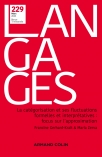
Langages N° 231 (3/2023)
Pour acheter ce numéro, contactez-nous
Recevez les numéros de l'année en cours et accédez à l'intégralité des articles en ligne.
En tant que « discours de transmission des connaissances », la divulgation a longtemps été considérée comme reposant sur la reformulation d’un « discours de recherche » préexistant. Dans cet article, nous soutenons que les opérations de reformulation principalement employées dans l’adaptation des textes à leurs destinataires sont à la fois paraphrastiques et non paraphrastiques et qu’elles obéissent à deux principes généraux, que nous appelons l’approximation et l’explicitation, en tension l’un avec l’autre. Nous analysons ces opérations à partir d’une étude de corpus de textes médicaux explicatifs, consacrés au syndrome de l’insuffisance cardiaque.
As a “discourse of knowledge transmission”, popularisation has long been considered to be based on the reformulation of a pre-existing “discourse of research”. In this article, we argue that the reformulation operations primarily employed in adapting texts for their intended recipients are both paraphrastic and non-paraphrastic, and that they obey two general principles in tension with each other which we refer to approximation and explicitation. We analyse these operations through a corpus study of medical explanatory texts devoted to heart failure syndrome.

